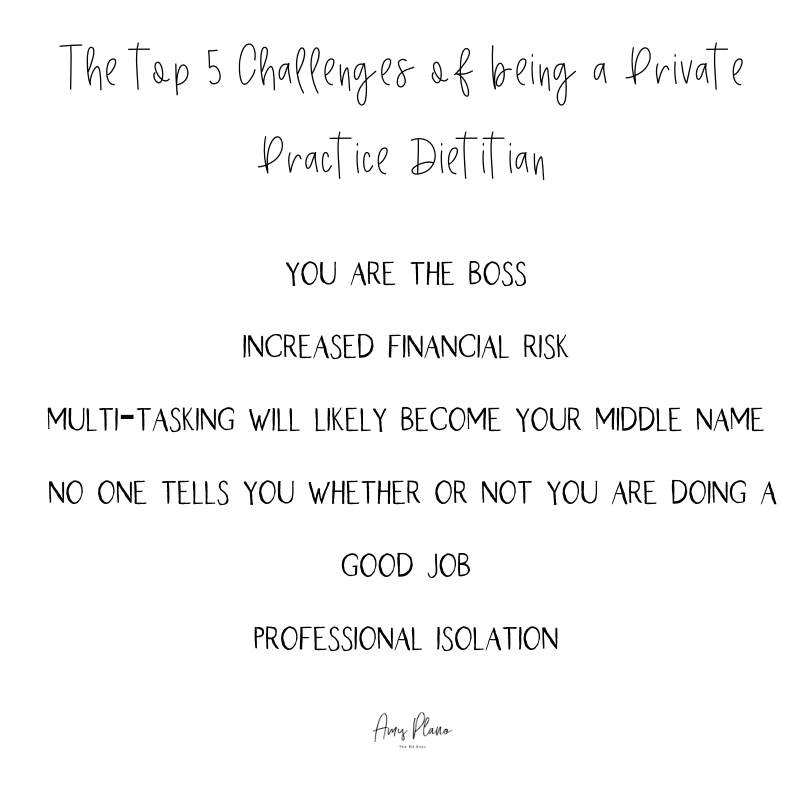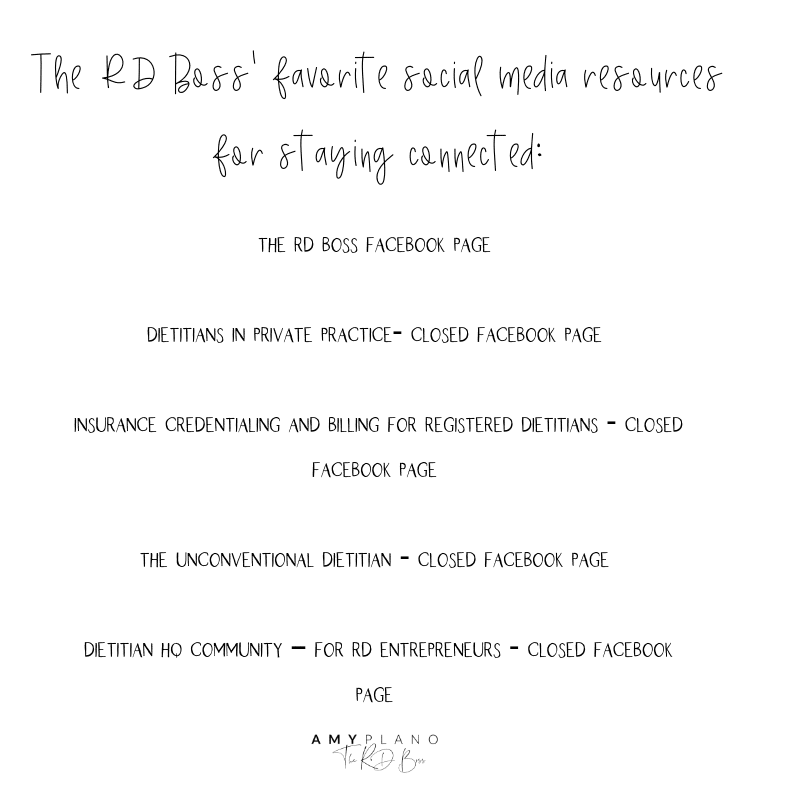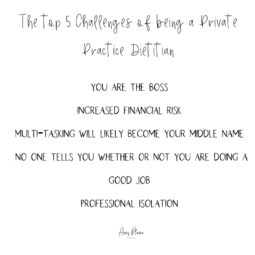Top 5 Challenges of Being a Private Practice Dietitian
Last week, we got all pumped up about all the really awesome reasons to be stoked about opening a nutrition private practice. This week – The Reimbursement Dietitian is going to get real and address the challenges of being a private practice dietitian. This is by no means a way to discourage you. Absolutely. Friggin’. Not. I however, sometimes think that people think that running your own practice is all rainbows, unicorns and glitter. Girl it ain’t. So, let tackle:
You are the boss
You knew this was coming right? As much as being your own boss means you have total control over your job – it also means you are in charge of everything. This means all your policies, systems, forms and paperwork needs to originate with you.
In private practice, you will soon begin to realize that every decision to be made in your practice is made by you and you alone. If you have come from a team environment, and most of us have, it requires some adjustment. As the person at the top, there’s no one to run things by or team members to collaborate with. If you are new to being a small business owner some of this may seem daunting. However, it does not have to be!
If someone had said to me, “Hey Am – I have all the resources, systems and forms to help you get started in private practice.” I would have been all in – in a heartbeat. There are SO many things you need to do when you are getting started in private practice. But save yourself a boatload of time and aggravation and purchase The Reimbursement Dietitian – Starter Pack. This way you have all the resources you need and focus all your time growing your empire.
The Reimbursement Dietitian Tip:
Don’t be afraid to ask for help. You don’t need to invent the wheel. While I did in fact create all the forms and systems in my practice from scratch; the only reason why I did this was because prefabricated resources DID NOT exist.
Increased financial risk
When you are an employee there is very little financial risk. You show up for work, do your job and get paid. Often your employer contributes a portion of your health insurance, they assume responsibility for your liability insurance and they even pay you for taking time off.
In private practice the scenario is much different. While your potential income can be MUCH higher; so is the financial risk.
Unfortunately, if your patients don’t show up for their visits you don’t get paid. That is not to say that you cannot charge them if they don’t properly cancel; however in order to make money in private practice you need to have a steady flow of patients. Also if you have a slow month; you still need to pay your rent and cover the cost of your utilities.
There can be many financial challenges of being a private practice dietitian. Aside from rent you also have additional expenses like liability insurance and start-up costs like purchasing your own computer, printer and fax. In addition, expenses such as small things like toilet paper and paper towels for the bathroom, paper and toner for the printer can all start to add up.
The Reimbursement Dietitian Tip: Don’t quit your day job. Yes, there will come a time when you burn your bra and quit your day job. And I sincerely hope to be there to high-five you. But I would be lying if I said that would be sooner than later. I worked for almost ten years as a clinical dietitian while working my side hustle of private practice. That way I had a steady, uninterrupted flow of income to pay for all the fun expenses of running a startup small business. Was it hard? Absolutely! Did I sleep much? Hardly. Was it worth it? A big giant “Hell Yeah!”
Multi-tasking will likely become your middle name
Hi my is Amy Plano and I am a Registered Dietitian and occasional secretary, accountant, social media manager, scheduler, biller, coach and anything else you can pretty much identify as a job title in a small business! In private practice we often wear many hats – most of them at the same time.
While it seems evident that your main job should be seeing patients; this is not always the case. First, you have to market your services and get patients through your door. This may be word of mouth, via social media or traditional marketing channels. You also need to design packages and establish a fee schedule for your services so you have something to sell these patients.
And let’s not forget the super fun finance piece. You need to bill for your services as well as perform accounting tasks and keep very detailed expense summaries. And sadly this is only a handful of tasks you are responsible for when you are running a nutrition private practice.
I don’t tell you all of this to freak you out. But, the challenges of being a private practice dietitian are certainly real. More importantly, I assure you none of these tasks are hard. You are fully capable of executing them all like the champ you are. I just want you to know what you are signing up for when you decide to open up your own nutrition private practice.
The Reimbursement Dietitian Tip:
In the beginning, learn how to do ALL the tasks in your practice on your own. Even the billing. That way when your business grows and you are in a financially better position you can hire someone to complete the day-day tasks of running your business.
However, if you jump the gun, and hire someone out of the gates #1: you likely don’t have the income to cover the cost and #2: you will never learn the important details it takes to run a successful private practice. You should know EVERYTHING about your business – especially the details. The details really matter. I can provide countless experiences about those dang details but I won’t bore you. Just know that you should know your practice inside and out especially before you let anyone else in. This is your baby and you need to protect all angles at any cost.
No one tells you whether or not you are doing a good job
I know what you are thinking. How the heck can this be one of the challenges of being a private practice dietitian? Big girls don’t need external validation, pats on their backs or gold stars. Well, sister I am here to tell you we do. We need all of those things to succeed not only in life; but more importantly in our private practice.
When you work for yourself there is generally no one to critique your performance. You don’t have a supervisor who regularly monitors your performance, provides guidance, and/or feedback. You are the boss after all. Therefore, sadly you have no idea if the job you are doing running your practice is satisfactory or requires improvement.
And after 10 + years of running a successful nutrition private practice what I can tell you with 100 % certainty is this – we can all improve in some manner. Whether it be in our skill set as practitioners, how we conduct ourselves in our business transactions or just in our day-day systems. In private practice there are so many areas in which we can improve and further develop. But when you work for yourself these areas are not always so self-evident.
The Reimbursement Dietitian Tip:
There are no performance appraisals or annual reviews. Which may seem like something you applaud. However, working for yourself requires you to be introspective in nature. You need to be able to systematically assess all areas of performance in your practice and constantly ask yourself what am I doing well? What do I need to improve on? While this may seem pretty straight forward, it requires time, discipline and dedication to yourself and practice on an ongoing basis. I would highly suggest getting a coach or mentor when you first start your practice. That way you have someone to help supervise what you are doing in your practice and provide constructive feedback. Or at the very least provide your clients with comment cards or regular patient satisfaction surveys.
Professional isolation
Professional isolation is a little bit of a sleeper when it comes to the downfalls of being in private practice. No matter how many patients you see; without professional interaction it can get a little lonely in private practice. I so clearly remember the early days in my private practice. I had planned for many things, but I had not developed a plan to manage the isolation that so many solo practitioners face.
Most counselors do not intend or desire to operate in professional isolation. Yet to maintain high patient loads, many of us are forced into over-scheduling clients back to back on days or during periods when both client and counselor are available. Over time, daily pressures and life circumstances leave dietitians in private practice often with limited time for adequate breaks between counseling sessions or time to attend to professional needs, such as supervision and consultation for difficult cases.
The Reimbursement Dietitian Tip:
The simplest approach to addressing the issue of professional isolation is for dietitians to seek direct feedback on essential counseling skills such as case conceptualization, treatment planning, intervention, and feedback with difficult cases. I highly recommend and encourage dietitians to stay connected. Whether it be on DPG listservs, closed-facebook pages, seeking out a private practice mentor or joining your state affiliate and becoming involved.
There are SO many ways to stay connected directly to our profession. Technology aided communication can help dietitians in private practice exchange information and perspectives on theoretical interventions, new approaches, clinical treatment, emerging issues and legal and ethical issues.
There is no lack of opportunity for us to engage in professional networking that can lead to personal and professional awareness, and hopefully improved outcomes for our patients.
Social Media Links:
The Reimbursement Dietitian FaceBook Page
Dietitians in Private Practice Closed Facebook Page
Insurance Credentialing and Billing for Registered Dietitians Closed Facebook Page
The Unconventional Dietitian Closed Facebook Page
Dietitian HQ Community – for RD Entrepreneurs closed Facebook Page
Conclusion:
So, it not a surprise that there are clearly some awesome benefits to being in private practice. But there are also some challenges of being a private practice dietitian. However, as a veteran private practice dietitian, I can tell you with an honest heart that the benefits outweigh any of the negative aspects.
Is running a successful practice super hard? Yes, especially at first. But just like with anything in life there is nothing you cannot do if you put your mind to it.
More importantly, The Reimbursement Dietitian and her services help soften the blow. Aside from the free resources offered in this section here, The Reimbursement Dietitan offers additional paid resources and services to help make your dream of running a successful nutrition private practice a reality.
Interested in learning how The Reimbursement Dietitian can help you turn your dream of running a successful nutrition private practice a reality? Click here to watch my program video.




Reader Interactions